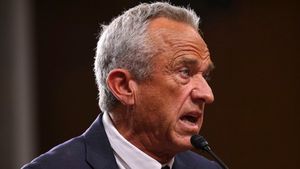In a matter of days, an estimated six million joyful visitors will descend on New York City to stage and partake in what's sure to be both joyful and insistent -- an epic, colorful celebration of LGBTQ+ identity, community, resilience, history and fun. But underneath the pop and pomp, there's a creeping reality that's getting little attention.
We are slipping backwards. And this Pride, despite celebrating what few thought would be accomplished in the 50 short years since Stonewall, through a plague and through an ensuing cultural sea change, is different not because of the size of the party or the demarcation of a landmark anniversary, but because instead of celebrating gains, we are watching a succession of losses.
Here's what I mean:
For nearly a decade, each June has been a step forward for LGBTQ+ rights. In June of 2011, the world reacted with a mixture of happiness and not a small amount of shock - New York had passed marriage equality the day before Pride. In a midnight vote, New York became the largest state to do so, giving a jolt to the LGBTQ+ rights movement in, as the New York Times banner headline put it, the state where it was born. The wins kept coming. In June 2013, the U.S. Supreme Court ruled that the Defense of Marriage Act (DOMA) was unconstitutional -- a fight waged by New York widow Edith Windsor -- and knocked down Proposition 8, which brought marriage equality back to the state of California, thanks to the efforts of Perry vs. Schwarzenegger. And in June 2015, the Supreme Court ruled that the fundamental right to marry is guaranteed to same-sex couples by both the Due Process Clause and the Equal Protection Clause of the 14th Amendment, in the landmark Obergefell v. Hodges case, in which the majority of justices sided with an Ohio man, James Obergefell.
Trending stories
In short, June had become a good month, legally, for LGBTQ+ rights. Fast forward to this month in 2019: the landscape has changed radically and terrifyingly.
The Trump Administration has worked tirelessly to attack fundamental LGBTQ+ rights from Day One. Most recently, the White House led efforts to oppose the Equality Act, a proposed amendment to the Civil Rights Act of 1964 that would ban LGBTQ discrimination. The federal government has also rolled back protections for transgender students, and even banned patriotic and capable transgender men and women from serving in the military. In an effort reportedly led by Vice President Mike Pence, the administration has also strongly backed so-called religious liberty ordinances, opening doors to permit discrimination of LGBTQ+ Americans in public accommodations and in commerce; as well is in healthcare and adoptions.
Federal law is only part of the problem, albeit the most visible and prominent. In right-wing state houses across America, multiple legislatures have begun to attack and repeal LGBTQ+ rights. At the beginning of this year, the Arkansas Supreme Court ruled that a city could not enforce an ordinance that banned LGBTQ+ discrimination. In Texas, 28 bills promoting LGBTQ+ discrimination have been introduced since February. In fact, according to workplace advocates Out & Equal, only 22 states and the District of Columbia prohibit employment discrimination on the basis of sexual orientation or gender identity. What's more, many still allow abusive conversion therapy practices to continue.
This is to say nothing of the fact that efforts to strip healthcare away from the vulnerable disproportionately affects LGBTQ+ people, low-income Americans and communities of color; and we are also seeing a horrifying number of deaths of transgender women of color, most recently Zoe Spears in Maryland and Layleen Polanco in New York.
And now, newly appointed conservative justices Neil Gorsuch and Brett Kavanaugh who sit at the helm of the U.S. Supreme Court - the very institution that once moved us forward - may well be determined to take us back.
I fear new rulings would not go the way of Windsor, Perry, or Obergefell.
In the midst of all these direct attacks on the fundamental rights and basic dignities of the LGBTQ community, celebrations like Pride are more important than ever - but they are also occasions to fight and strategize, and remember how we got here. It's a time for color, music, laughter, but also a time to remember that the essence of our movement is a fight against an unacceptable status quo, and that the status quo that was ours one day can change quickly the next.
Stonewall 50 is also a moment to remember that our civil rights movement needs to be in constant motion, just like the attacks against us are. We must have the pride mindset all year long and be ready at all moments to come together to be heard, fight, and lead the way where our politicians are failing. This is why I will be convening elected officials, movement leaders, donors and activists in November, well after pride, to organize for 2020.
So as the party ramps up, as presidential candidates march in Manhattan, and wave our rainbow flag, and as leading corporations sponsor floats and promote events, we must not forget the successful plot that's unfolding nefariously in the background. And as the music plays, we must be thinking about the work ahead and the fights to come. Stonewall is a legacy that is now our sacred responsibility to carry. We must be ready for the next Stonewalls. They are now.
HENRY R. MUNOZ III is a nationally recognized Latinx leader, prominent LGBTQ+ activist and one of the country's leading Latino philanthropists. Mr. Munoz was the first minority or openly gay citizen to be elected as finance chairman of the Democratic National Committee. Henry and his husband, Kyle Ferari- Munoz, were married by former Vice President Joseph Biden in 2017 and are both active in the LGBTQ rights movement.

























































































Op-ed: We Are Responsible for Carrying the Torch Lit at Stonewall
Stonewall 50 is also a moment to remember that our civil rights movement needs to be in constant motion, just like the attacks against us are.
Henry R. Munoz, III